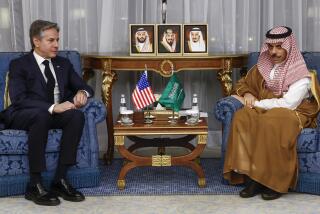Shultz to Visit Mideast on Way to Soviet Talks
- Share via
UNITED NATIONS — Secretary of State George P. Shultz will visit the Middle East on his way to a meeting in Moscow with Soviet Foreign Minister Eduard A. Shevardnadze later next month, State Department spokesman Charles Redman said Monday.
Shultz, who was at the United Nations to continue talks with foreign ministers attending the current session of the General Assembly, will visit Israel on Oct. 18, Redman said, but no other destinations have been fixed. However, the spokesman added, the secretary has been in contact recently with President Hosni Mubarak of Egypt and King Hussein of Jordan.
Other U.S. officials, who spoke on condition that they not be identified, said Shultz will leave Washington on Oct. 16 for Cairo, spend the following day there and go on to Israel for the next two days. He then is to go to Amman, Jordan, late on Oct. 19, leaving for Helsinki, Finland, on Oct. 20.
Will Prepare for Summit
After a day in the Finnish capital, Shultz will proceed to Moscow for the previously announced two days of talks with Shevardnadze on Oct. 22 and 23 to clear up details of a Washington summit later this year between President Reagan and Soviet leader Mikhail S. Gorbachev.
The only detail of Shultz’s schedule that was made public Monday was that Tel Aviv University and the Weizmann Institute, a scientific and technological institution founded by Israel’s first president, Chaim Weizmann, will award honorary degrees to the secretary of state.
The Middle East visit would be Shultz’s first since 1985, and now, as then, he is expected to explore ways in which Israel and Jordan might be brought together for peace negotiations.
“There is not necessarily anything new going on,” a U.S. official said of the slow-paced peace process. “It would come up in Moscow, so this was thought to be a good time to review the bidding and give the process a little push.”
The Reagan Administration’s policy is to promote any process that would bring Jordan and Israel to the peace table. Jordan favors an international peace conference, with Palestinian and Soviet participation, and perhaps under the sponsorship of the U.N. Security Council to provide a framework for bilateral talks between Israel and its Arab neighbors.
Opposed to Soviet Role
The United States remains generally opposed to Soviet participation, arguing that Moscow has no legitimate interests in the Middle East, especially as long as it restricts Jewish emigration and refuses to restore diplomatic relations with Israel, broken off after the 1967 Six-Day War.
The Soviet Union recently has stepped up the pace of Jewish emigration. Earlier this year, a Soviet consular mission visited Israel to survey Russian church property in Israel and to examine that section of Finland’s embassy in Tel Aviv that handles Soviet interests in Israel.
Israel’s Labor Alignment, led by Foreign Minister Shimon Peres, favors the international conference formula, and Peres was in Los Angeles on Monday, warning in a speech to the World Affairs Council that an opportunity to convene such a conference may be lost if too much time passes and both Israel and the United States become distracted by national elections next year.
The conservative Likud Bloc, whose leader, Yitzhak Shamir, holds the prime minister’s office in a coalition government with Labor, remains vehemently opposed to an international conference.
Don Shannon reported from the United Nations, in New York, and Norman Kempster from Washington.
More to Read
Sign up for Essential California
The most important California stories and recommendations in your inbox every morning.
You may occasionally receive promotional content from the Los Angeles Times.










